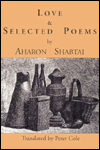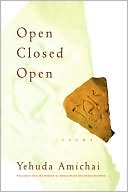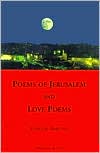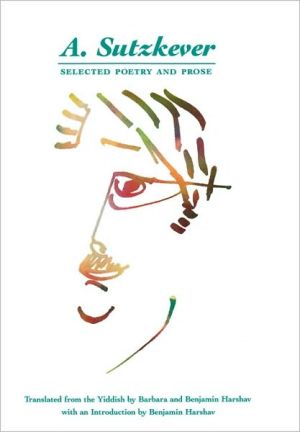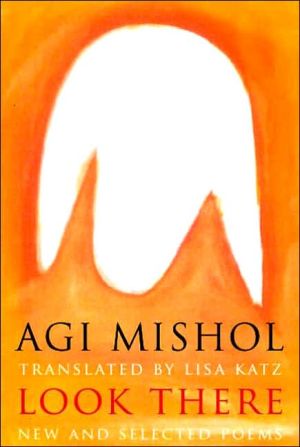Love and Selected Poems
Poetry, now available in paperback. "In his fusions of the sensual and the spiritual, the ordinary and the exalted, the sexual in the suffering psyche and the intelligent conciousness searching and spinning through history, myth and layers of language, Shabtai is one of the most exciting poets writing anywhere, and certainly the most audacious" C.K. Williams. These poems, written between 1966 and 1995, juxtapose the personal with the universal and the everyday with the mythical in terse,...
Search in google:
Aharon Shabtai, now in his late fifties, is the most important Israeli poet of his generation. This is his first book to be published in English.Publishers WeeklyConsider the difficulties of translating poetry from Hebrew, a language read from right to left, its individual letters laden with symbolic and mathematical meanings of their own so that a single word can add up to an entire morality play. There is little that English can do to match that, but Cole, a poet, has nonetheless come up with a spirited and speedy version of Shabtai's work. The lines are short, simple and severe, with the occasional schmear of transliterated Hebrew for flavor: "I'm a man/ who murdered love// simply/ with his own two hands// took/ and snapped its neck/ like a lamb// and then, with his fee,/ his slaughterer's fee,// promptly turned/ into// a groisser hocham/a wise ass." There are few complex issues to grasp here. Drawing on rabbinic and Hellenic traditions, Shabtai elaborates on straightforward themes: lust, homestead and more lust. His long poem "Kibbutz" is a vivid checklist of "tools and their objects/... a hooked rod/ for catching chickens, a beak clipper," while the title poem (and much of the rest of the book) describesin a spirit more befitting a sailor than a Tel Aviv father of sixa woman that he wanted, a woman that he had and lost and various gorgeous ladies of mythology. In addition to his fluent translation, Cole provides an incisive introduction that sets Shabtai and his work in context. (Aug.)
IntroductionLove1Before School99Our Culture103The Dining Hall106Education111The Domestic Poem123The Revolt142from Part II143The Car169A Street170"The last year of my marriage"171Spoon and Fork172The Prayer Book173"Sometimes a step"174The Heart175The Onion Basket176"Masha, my mother"177"I tossed and turned"178To My Daughter179The Shoe180The Door181Honor182"Two or three months apart"187"I'm obliged to honor your cunt"188"I pay no attention"189"Let's join our apartments' openings"190"The body's our final farm"191"Ziva"192"I brush the teeth of the beast"193"The essence of wisdom"194"I pound my egghead"195"The pig reads nothing"196"Like the ant and the seed"201"Through folly"202"Like a butterfly"203"My heart's so full of shit"204"With each passing season and year"205"Day after day after day"206"When you were twenty"207Consecration211For National Poetry Week 1992212Again You're in Paris213Finding It Hard to Fall Asleep214I've Always Missed Out215Drenched With Sweat216If All the World Were Contained217Ah Nili218Never Again Will I Break that Record219Happiness220Nothing Will Come of You221
\ Publishers Weekly - Publisher's Weekly\ Consider the difficulties of translating poetry from Hebrew, a language read from right to left, its individual letters laden with symbolic and mathematical meanings of their own so that a single word can add up to an entire morality play. There is little that English can do to match that, but Cole, a poet, has nonetheless come up with a spirited and speedy version of Shabtai's work. The lines are short, simple and severe, with the occasional schmear of transliterated Hebrew for flavor: "I'm a man/ who murdered love// simply/ with his own two hands// took/ and snapped its neck/ like a lamb// and then, with his fee,/ his slaughterer's fee,// promptly turned/ into// a groisser hocham/a wise ass." There are few complex issues to grasp here. Drawing on rabbinic and Hellenic traditions, Shabtai elaborates on straightforward themes: lust, homestead and more lust. His long poem "Kibbutz" is a vivid checklist of "tools and their objects/... a hooked rod/ for catching chickens, a beak clipper," while the title poem (and much of the rest of the book) describesin a spirit more befitting a sailor than a Tel Aviv father of sixa woman that he wanted, a woman that he had and lost and various gorgeous ladies of mythology. In addition to his fluent translation, Cole provides an incisive introduction that sets Shabtai and his work in context. (Aug.)\ \ \ \ \ Library JournalThis volume introduces American readers to an Israeli poet who emerged during the mid-1980s. Shabtai, previously known as the foremost translator of Greek poetry into Hebrew, splays his poems with sexual references that in Greek, and possibly in the original Hebrew, might be sensual: "Eroticin the ancient sense/ the daemonic." In English, they contain a superfluous vulgarity verging on bestiality. Despite the translator's focus on "Love" as the work that brought him to prominence as a poet in Israel, American readers might relate better to selections from other volumes included here, such as "Kibbutz" or "Begin" (the latter a collage built around Menachem Begin's life in the Israeli underground and the birth of his second child). Abandoning the cadences found in other modern Israeli poets and adopting, as translator Cole points out, the style of Williams or Olson, these poems play with language and structure, breaking new ground. For comprehensive poetry and Judaica collections only.Rochelle Ratner, formerly Poetry Editor, "Soho Weekly News," New York\ \
